The literature of Myanmar spans over a millennium. The Burmese language, unlike other Southeast Asian languages, adopted words primarily from Pāli rather than from Sanskrit. In addition, Burmese literature tends to reflect local folklore and culture.

Journal Kyaw U Chit Maung was a journalist and patriotic writer of Burma / Myanmar. He worked for Bogyoke Aung San, the father of Burmese politician Aung San Suu Kyi. He was Chief Editor of New Light of Burma:. Later his own Journal Kyaw Newspaper became well known in Burma.
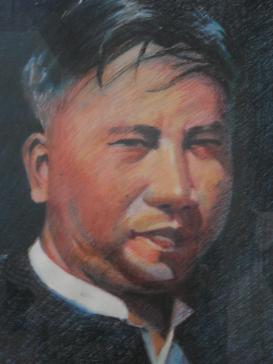
Ludu U Hla was a Burmese journalist, publisher, chronicler, folklorist and social reformer whose prolific writings include a considerable number of path-breaking non-fiction works. He was married to fellow writer and journalist Ludu Daw Amar.
The cinema of Burma dates back to the 1910s. The person who created the first silent film was Ohn Maung.

James Hla Kyaw (1866-1919), also known as U Hla Kyaw, was a pioneer Burmese novelist and author of the first Burmese novel titled Maung Yin Maung, Ma Me Ma. Burmese novels had existed before but they were written in verse not in prose. Most of these novels were based on Buddhism, myth and legend and history of Burma; therefore there were no novels that were based on everyday lives like Maung Yin Maung, Ma Me Ma.
Myanmar National Literature Awards are awards presented to a Burmese author who has published a particularly lauded piece or body of work. There are awards for forms of writing ranging from poetry to novels. Many awards are also dedicated to a certain genre of fiction or non-fiction writing. Most literary awards come with a corresponding award ceremony.
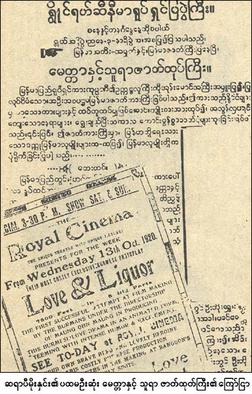
Love and Liquor is a 1920 Burmese black & white silent film directed by Ohn Maung, written by P Moe Nin and starring Nyi Pu. It was the first Burmese feature film, and the day it premiered, 13 October 1920, is commemorated annually as Myanmar Movie Day.
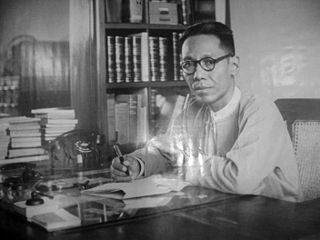
Thiri Pyanchi Min Thu Wun was a Burmese poet, writer and scholar who helped launch a new age literary movement called Khit-San in Burma. He is the father of Htin Kyaw, president of Myanmar from 2016 to 2018.

The Myanmar Motion Picture Academy Awards are presented annually to honour both artistic and technical excellence of professionals in the Burmese Film Industry of Myanmar. The awards ceremony has been held annually since 1952. Each winner is presented with a golden statue and in recent years also a cash prize.

A Yake is a 2018 Burmese drama television series. It is based on the eponymous popular novel written by Ma Sandar. It aired on MRTV-4, from May 2 to June 12, 2018, on Mondays to Fridays at 19:00 for 31 episodes.

Rose is a 2019 Burmese drama television series. It was based on the popular eponymous novel written by Ma Sandar. It aired on MRTV-4, from August 15 to September 17, 2019, on Mondays to Fridays at 19:00 for 22 episodes.
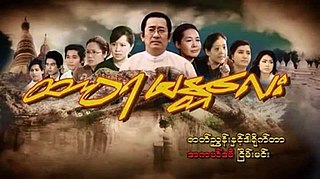
Forever Mandalay is a 2014 Burmese drama television series. It is a story of Mandalay. It aired on MRTV-4, from February 10 to April 9, 2014, on Mondays to Fridays at 19:15 for 43 episodes.
Alinkar Kyawswa is the highest national honor of recognition of an individual for their artistic skills by the government of Myanmar. From 1949 to 2022, there were about 57 recipients of this award in Myanmar.

Ba Than was a Burmese school teacher, writer, and historian in the early 20th century British Burma. He is best known for his seminal Burmese history textbook Myanmar Yazawin, used in Burmese high schools from the 1930s to the 1950s. He is also known for his 1919 novel B.A. Maung Ba Lwin and the short-lived Myo-Chit newspaper, which he co-founded in 1924.
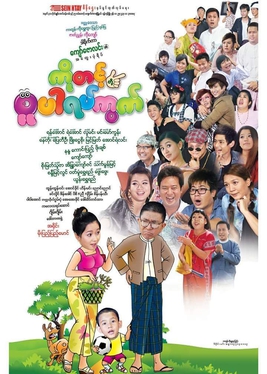
Ko Tint Toh Super Yat Kwat is a 2014 Burmese comedy film, directed by Kyaw Zaw Lin. The film, produced by Sein Htay Film Production premiered in Myanmar on December 5, 2014.
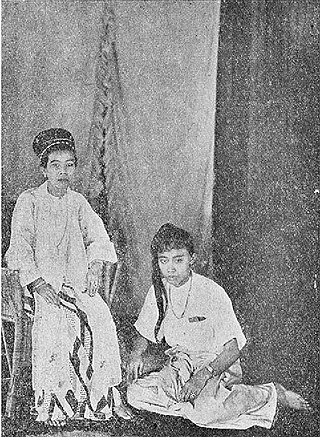
"Mya Chay-Gyin" Ma Ngwe Myaing was a Burmese dance performer of the twentieth century, in the tradition of Ma Htwe Lay. She is said to be a mother of the Mandalay's third dramatic arts era.
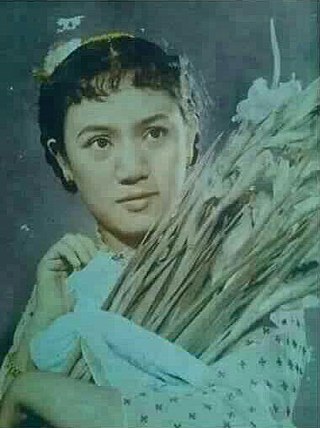
May Thit was a Burmese actress and singer. She won Best Actress Award for 1960, Best Supporting Actress Award for 1964 and 1976 in Myanmar Motion Picture Academy Awards. She was famous around between 1950s and 1990s.











